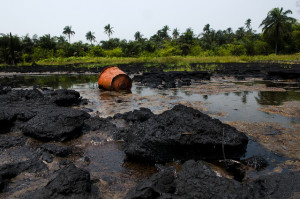
Amnesty International says it is seeking to enlist digital activists to help track oil spills in the Niger Delta region of Nigeria.
Amnesty, in a press release on Monday, called the project “Decode Oil Spill Project” which it described as a revolutionary crowd-sourcing platform to help the human rights group ensure justice for communities devastated by oil spills in the region.
The project is expected to engage thousands of digital volunteers, Amnesty said.
“The Decode Oil Spills project means anybody with a mobile phone or laptop can contribute to vital research into human rights abuses, and marks a new chapter in the way people can hold companies to account,” said Milena Marin, Amnesty International’s Senior Innovations Campaigner.
Marin said the Niger Delta is one of the most polluted places on earth.
“For far too long, wealthy oil companies have evaded justice for the utter devastation they have caused to the land and water of the Delta, and to the livelihoods of hundreds of thousands of people in the region.
“Shell has relied on demonstrably false claims to avoid accountability, but with the help of digital activists from around the world we are determined to uncover the truth,” she said.
Amnesty said hundreds of oil spills occur in the Niger Delta every year and that they are rarely cleaned up properly, adding that decades of pollution linked to the oil industry has destroyed people’s livelihoods, undermined their rights to clean water and food, and put their health at serious risk.
The group said, for instance, there had been more than 1,700 oil spills from Shell’s operations in the region since 2007, while the Italian oil company ENI, though has smaller operations in the region than Shell, has reported even more spills – in excess of 3,000 since 2007.
Amnesty said there was a vast amount of publicly available data on Nigerian oil spills dating back to 2011 – too much for its researchers to analyze alone.
Much of this information, according to Amnesty, is only available in scanned, handwritten documents, making it impossible to extract information at scale.
Amnesty said it was, therefore, inviting digital volunteers to help determine the cause and location of oil spills by analyzing photos and documents using their smartphones, tablets or laptops, so that it could help bring the companies responsible to account.
On average decoders will be required to spend one minute per task, the group said.
Amnesty said that Shell had in the past made false statements relating to spills; for example, claiming that they were caused by oil thieves or pipeline saboteurs when they were in fact due to corroded pipes, so they can pay less compensation, or avoid cleaning up the pollution.
Amnesty said, with the Decoders platform, it has started building a community of tens of thousands of digital activists who are able to work with large volumes of “messy” information and transform it into structured evidence of human rights violations.
It said it has so far mobilized 45,000 digital volunteers from 150 countries to support its research and has successfully completed three projects, since the launch of the Decoders platform in June 2016.
Shell is facing a lawsuit in the Netherlands over its alleged complicity in the 1995 execution of nine Ogoni men by the Sani Abacha-led military regime.
Copyright Ships & Ports Ltd. Permission to use quotations from this article is granted subject to appropriate credit given to www.shipsandports.com.ng as the source.